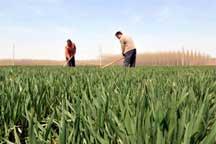Chinese gov't continuing to push for more rural spending

 0 Comment(s)
0 Comment(s) Print
Print E-mail CNTV, January 20, 2014
E-mail CNTV, January 20, 2014
For the past 10 years, the Chinese government has been trying to get rural consumers to spend more to boost the economy, especially in the country's interior far from the more prosperous, eastern coast. But experts are divided, with some analysts seeing a need for more measures to stimulate demand in the countryside. Others see a changing pattern of consumption as farmers move to cities to work. Liu Yang reports from Sichuan, where many former villagers are changing the way China spends.
Jiang Hongqiong is just one of tens of millions of ordinary farmers who no longer has to only rely on the land... Her husband and daughter are migrant workers. That means more money for the family, and more money to spend.
"I pay eight to nine hundred yuan for social insurance. Most of the rest goes to pay for living expenses. There’s not much left. So I only go shopping when I really need to buy something." Jiang Hongqiong, farmer of Shuangliu county, in Sichuan, said.
Currently, the family earns about about 3,000 yuan each month, some 500 U.S. dollars. When Jiang goes shopping, she’s always on the lookout for a bargain. And she loves the holiday sales.
"This electric rice cooker is a bit expensive. But it’s pretty useful. So I’ll get two of them; one for my sister." Jiang said.
According to a Nielsen survey, in mid-2012, the average rural shopper spent about one third of what an average urban consumer would spend. It’s a problem the government has been working on. Professor Zhang Xian is an expert on the rural economy. He says that rural residents are more likely to spend more of their disposable income than urban residents, who tend to save more. If incomes increase at the same rate for farmers and city dwellers, then the countryside will continue to spend more of its disposable income than the city. According to Professor Zhang, this is a good sign for the future.
“Our economy is now in transition. Some analysts say domestic demand is too low. But they may not be right. They talk about a lack of consumer demand. But they ignore the fact that after the foreign financial crisis, demand from overseas slowed. This led to excess capacity. So we’re now relying on domestic demand to make up the shortfall in demand from abroad. So, it might look like domestic demand is lacking, but that’s only part of the problem." Professor Zhang said.
Despite their differences, experts agree that the economy will grow some seven point five percent in 2014, much the same as last year. They say that this slowdown in recent years is inevitable. It’s the result of China’s shift away from export-led expansion to greater reliance on domestic demand. And as Jiang Hongqiong has shown, there’s plenty of that, even if it’s more likely in the countryside.





